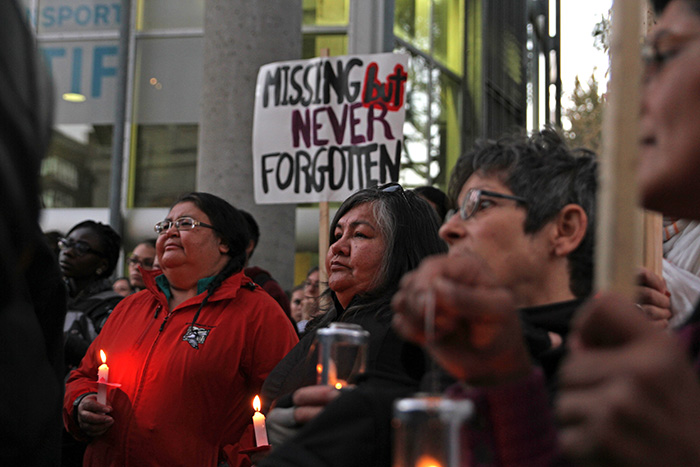On Oct. 4, hundreds of Montrealers gathered to walk in solidarity at the 11th Annual March for Missing and Murdered Indigenous Women. The march was hosted by Montreal’s Centre for Gender Advocacy in conjunction with its Missing Justice Collective. A total distance of 1.7 kilometres was covered, starting from Place Émilie-Gamelin and walking along Rue St-Denis.
The event was held to bring awareness to the Canadian legacy of marginalization and violence towards indigenous women. A 2014 Royal Canadian Mounted Police report found that 1,181 indigenous women had been murdered or were considered missing from 1980 to 2012. The Native Women’s Association of Canada estimated this number to be about 4,000. In response, the Canadian government launched a two-year national inquiry into Missing and Murdered Indigenous Women and Girls on Sept. 1.
Ellen Gabriel, a Mohawk activist and former president of the Quebec Native Women’s Association, expressed doubts over the effectiveness of the inquiry during a speech at the march.
“We need to remember that indigenous women have been asking for education, [and] sensitization at all levels of government, for many years [….]” Gabriel said. “While the inquiry goes on, colonialism goes on. While colonialism goes on, violence goes on. We cannot wait for any more rhetoric, for any more pain to happen, because in the two years that the inquiry will be organizing itself, we will lose more sisters, we will lose more children to the welfare system.”
Virginia Wabano, a research officer for the Cree Health Board in Northern Quebec, attended the march while she was in the city working to open two womens’ shelters in the James Bay Territory.
“Today, I’m marching because my friend’s mother was murdered in 1991, and her case was reopened today,” Wabano said. “It brings hope. I want to join the many families here to show I’m here to support them as well and that there is still hope.”
Gabriel called for all Canadian politicians and citizens to be educated about violence towards indigenous women. She emphasized, however, that concrete actions will come only if citizens demand change.
“If Canada is really sincere on reconciliation, then it must act within the school system, within the political system, within institutionalized systems, because the people must change their attitude. It’s not solely up to government,” Gabriel said. “[….You] as the constituents of these politicians that you elect into your parliaments, into your national assemblies […] you must demand the education and demand that the violence stop [….And you] must demand it now.”
According to Nakuset, executive director of the Native Women’s Shelter of Montreal, the current focuses of the indigenous women’s movement is on activism to educate and raise awareness, along with applying for funding.
“The inquiry is not going to be over for another two years and nothing is actually going to happen until after then,” Nakuset said. “So we need to, as a community, create solutions [….] Money is something we are working on, but whether we get it or not is a different story.”
Stacey Gomez, action coordinator at the Centre for Gender Advocacy, encourages students to join the Missing Justice collective, which meets once a week to strategize and take meaningful action against violence towards indigenous peoples. In addition to holding teach-ins and participatory exercises for groups to discuss the community’s role in the indigenous movement, the collective has also participated in ground searches for missing women. Gomez stated that new members and input are always welcome at the collective.
“We’re always looking for people to do promotion, help with public education, and bring new ideas forward about how we can amplify the voices and asks of indigenous people,” Gomez said.
Anouska Ralph, a second-year student of First People’s Studies at Concordia who also attended the march, stated that the role of foreign countries in prolonging violence against Canadian indigenous populations is also not acknowledged in international curriculums.
“I’m an English woman and I moved here two months ago,” Ralph said. “Back home [in England] we are not taught what we did here at all, it’s not in our history lessons. Being the people who did most of the damage, we should learn about this in school and we just don’t, so I feel like I have an obligation to be here and gain as much knowledge as I can.”
U2 Arts student Zoë Poole, who was marching for her second year in a row, felt the march has an important role in educating the public about violence toward indigenous women.
“Both times I found it an emotional yet empowering experience,” Poole said. “It amazes me that indigenous issues in Canada go so unreported that born-and-raised Canadians aren’t even aware of what occurs.”








